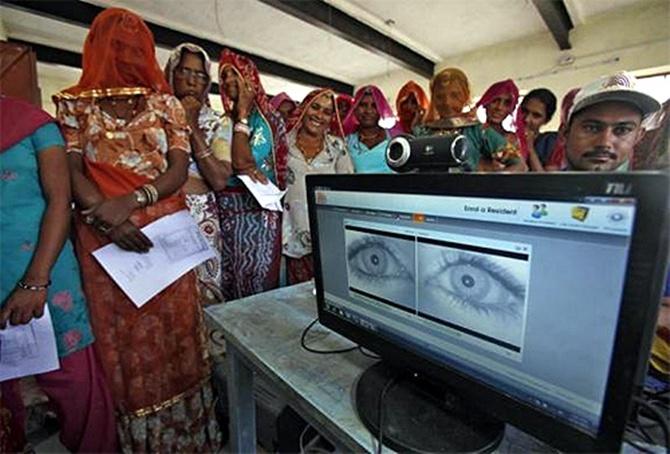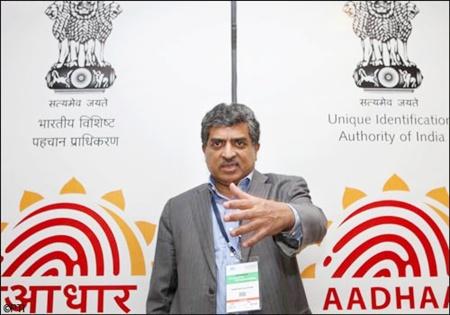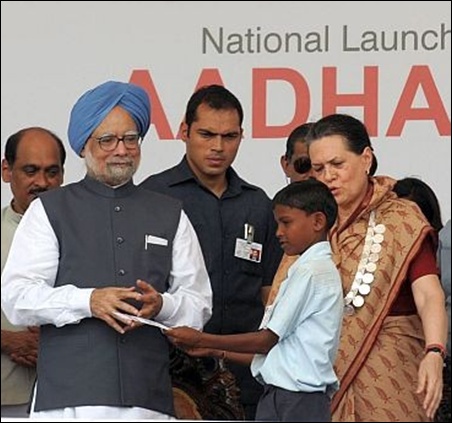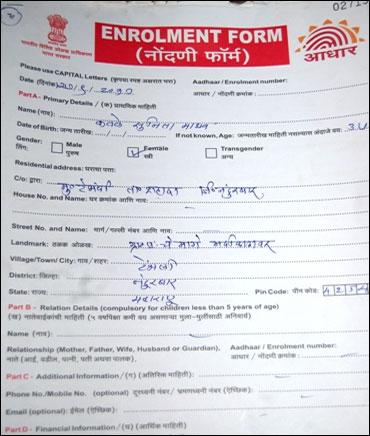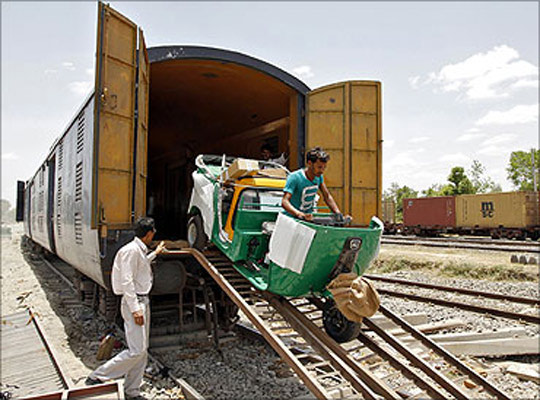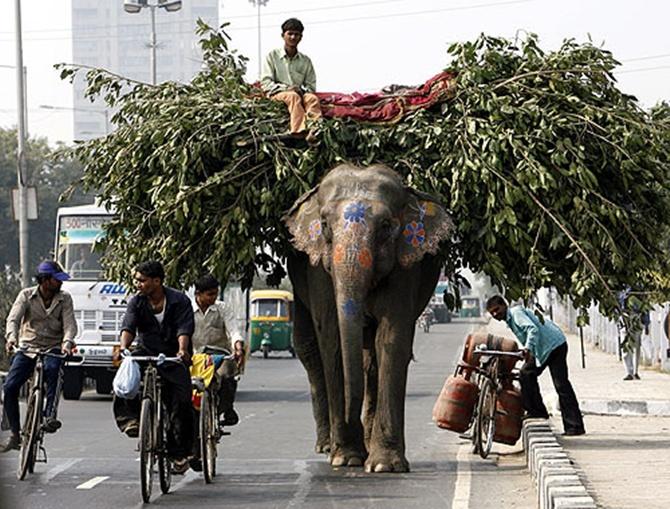 | « Back to article | Print this article |
Should Aadhaar be made mandatory?
There is considerable confusion among the people about whether they should or should not have an Aadhaar number, notes Jyoti Mukul
Even as the Supreme Court sits to hear arguments on the applicability of the unique identification number, popularly known as Aadhaar, the debate around the unique identification number has already shifted from its success or reach to whether it should be mandatory.
In an interim order, the apex court on September 23 held that the number could not be made mandatory and that no one should “suffer” because he or she did not have an Aadhaar number.
This is a necessary and important debate to have, if not entirely for the reasons cited in the public interest litigation that was filed by K S Puttaswamy, a retired High Court judge.
Click NEXT to read further. . .
Should Aadhaar be made mandatory?
Nor can the answers be framed in stark positives or negatives.
The concept of Aadhaar (the Hindi word for basis or foundation) has evolved since it was introduced in 2009.
The number, according to the website of the Unique Identification Authority of India that administers the programme, is ‘a voluntary service that every resident can avail [of] irrespective of present documentation’.
Yet, it has become mandatory for several things -- for instance, for those who access government doles in the form of scholarships, pensions and cooking gas subsidy.
In some states, it has become mandatory for registering marriages and property.
The upshot is that there is considerable confusion among the people about whether they should or should not have an Aadhaar number.
Click NEXT to read further. . .
Should Aadhaar be made mandatory?
Aadhaar’s benefit for an individual lies in the fact that it gives an identity without seeking residence proof, unlike other identity systems.
It is a portable number that can be used anywhere.
All that is needed is an introducer who confirms the identity and address of the he/she is introducing.
The non-necessity of residence proof, however, has become one of the grounds on which Puttaswamy has challenged the government’s programme, the argument being that such an identity proof is also being given to residents who are not citizens.
This argument can be countered by the fact that even some fundamental rights such as the Right to Equality under Article 14 under the Constitution is available to non-citizens within the territory of India.
Click NEXT to read further. . .
Should Aadhaar be made mandatory?
Nevertheless, the point whether Aadhaar should be given to citizens alone can be debated and argued either way.
The apex court, on its part, has ruled that the authority issuing an Aadhaar number has to check whether the person concerned is entitled to it and that ‘it should not be given to any illegal immigrant’.
Of course, the issue has acquired a political tinge since Aadhaar’s biggest driver is the much-feted direct benefits transfer programme which was also why the United Progressive Alliance government decided to spend Rs 2,342 crore (Rs 23.42 billion) on it (till March 31, 2013) and has allotted another Rs 2,620 crore (Rs 26.2 billion) for 2013-14.
Though the DBT essentially involves a change of delivery mode, not a fresh subsidy, the UPA government has projected it as a pro-poor programme by launching it at rallies.
Click NEXT to read further. . .
Should Aadhaar be made mandatory?
Even without the politicisation, it is true that the Aadhaar-linked DBT has made disbursal more efficient and targeted at intended beneficiaries, plugging the kind of leaks that are inevitable in central programmes that incur expenditures of over Rs 231,000 crore (Rs 2,310 billion) on subsidies and Rs 23,000 crore (Rs 230 billion) on social welfare schemes.
The most important point from the Supreme Court interim judgement, however, is that Aadhaar cannot be made mandatory and people cannot be made to ‘suffer’ because of the lack of legislative sanction.
This restricts the government’s ability to switch to this new mode of cash transfer in a bigger way, which is probably why the UIDAI has joined the government and public sector oil marketing companies in moving the Supreme Court against the interim order.
Click NEXT to read further. . .
Should Aadhaar be made mandatory?
In his PIL, Puttaswamy has argued the government should not be allowed ‘to circumvent the legislature’ and ‘avoid discussion, debate and voting’ in Parliament.
But the fact is that after it was introduced in Parliament in 2010, the government sat on the National Identification Authority Bill and it took a Supreme Court ruling for the Cabinet to clear the Bill on October 8, 2013.
Besides, not everything needs legislative sanction, though in a court of law, legislation has greater legal standing than executive orders.
To extend the argument, the entire public distribution system, pension and scholarship programmes and a host of subsidy, including the fertiliser subsidy, have no legislative backing.
In the case of PDS and education, the right to food and the right to education Acts were passed much after the actual programmes began.
Click NEXT to read further. . .
Should Aadhaar be made mandatory?
The PIL also argued that the process of issuing the number requires biometrics, which impinges on privacy.
Yet, it is the biometrics that makes Aadhaar unique and difficult to replicate, unlike other numbers such as the Permanent Account Number used for income tax purposes or even the voter’s identity card.
So, despite Puttaswamy’s petition arguing for it not being made mandatory, it is also true that the government has the right to ensure better disbursement of taxpayer money.
Take the case of the cooking gas subsidy, which in 2012-13 stood at Rs 39,558 crore (Rs 395.58 billion).
In some 98 districts where DBT has been launched, it means the UPA government would be paying each consumer about Rs 4,797 a year to buy nine cylinders at current market rates only if they have an Aadhaar number seeded with the LPG consumer number and a bank account.
Click NEXT to read further. . .
Should Aadhaar be made mandatory?
But the crucial issues of Aadhaar’s reach and the complex web of processes required before people avail of benefits that they were already accessing are certainly challenges the administration must address.
For instance, when Aadhaar was made mandatory for cooking gas subsidy in 19 districts with a grace period of three months that ended on August 31, only around 13 per cent of the population was compliant in all respects.
That does strengthen the case that a large majority of genuine consumers are being left out of a process that requires the Aadhaar number.
As things stand, 78 more districts have been added to the programme with 84 per cent of the population having Aadhaar numbers.
Click NEXT to read further. . .
Should Aadhaar be made mandatory?
Yet, just 24 per cent of the population is found to be fully compliant in 34 of these districts.
At the same time, some state governments, too, have succeeded in creating some sort of DBT without the Aadhaar.
This raises the issue of whether the massive exercise of Aadhaar could have been avoided since the option of National Population Registry was already available.
NPR currently uses Aadhaar as its backbone.
The UPA government, keen to plug its fiscal deficit by streamlining subsidies, could have easily dovetailed biometrics through legislative sanction with NPR even for non-citizens rather than create a mammoth called Aadhaar with its attendant complications.
